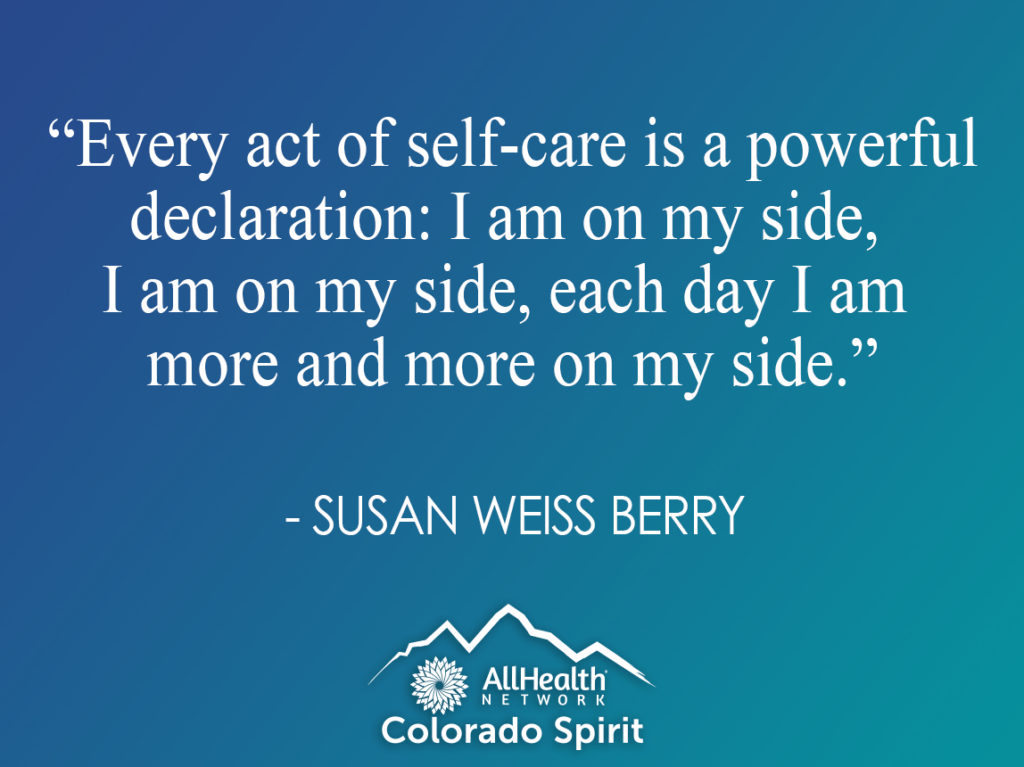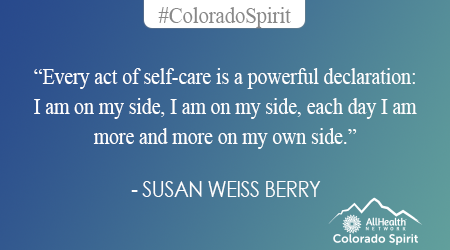This week’s post was written by Ayla Cook, the Colorado Spirit Older Adult Specialist. Ayla’s role allows her to specialize in supporting older adults, their families, and those who work with older adults. We are excited to have her share some tips with us!
The term “self-care” has recently been more frequently used in regard to managing stress related to the COVID-19 pandemic. Given the higher risk that older adults may face, they and those who support and love them are in a particularly vulnerable position to experience burnout, grief, worry, and symptoms associated with depression and anxiety. Self-care provides us with opportunities to make minor and major decisions throughout our day for the quality of life we are seeking. By intentionally caring for our emotional, mental, physical, and spiritual needs we can better manage life’s stressors and our responses to them.
Why is self-care important for older adults?
We all benefit from maintaining a healthy self-care routine. This provides a shift in focus and offers temporary mental breaks from the constant news coverage of COVID-19. In times such as this with limited travel and interaction, self-care may not be thought of as a priority. However, this will help us to create paths to a new normal that you can implement as we continue to navigate our way through this pandemic.
Some self-care activities include:
- Creating a daily schedule
- Exercise
- Maintain medication regimen
- If you live in a supported setting, engage with activity staff and request supplies
- Practice mindfulness
- Breathing exercises
- List out strengths and think about a time you’ve used them
- As you are comfortable and able, socialize with neighbors or other residents
- Ask for help
- Carve out time for religious or spiritual practices
How do I stay connected with my loved ones and community while physically distancing myself?
Physical distancing has been implemented as a way to protect ourselves and others from contracting COVID-19. The downside to this is that many older adults are experiencing negative consequences of isolation and loneliness. This can be particularly difficult for those who may not have adult children or family nearby, lack access to the internet or struggle with using virtual platforms. Staying connected to our social circles and support will help with reducing disconnectedness caused by physical distancing.
Connection activities can include:
- Use a phone with Facetime/screen time applications
- If smartphones aren’t for you, purchase an easy to use flip phone or install a landline
- Join a social group that meets online or on a telephone conference line
- Communicate your needs to those close to you
- Contact your religious or spiritual community and ask about physical distancing events they are hosting
- Grab a pen and paper and write to a pen pal
- Superficial interactions like waiving to the mail carrier or small conversations with others matter too
I’m a caregiver for an older adult. How can I use self-care?
Do you remember those safety instructions you’ve heard so often when you board a plane? “In an emergency place the oxygen mask on your face before placing it on the ones you’re caring for?” This is because airlines reported that often, when there was an emergency, the caregiver would faint after assisting others with their masks because they did not put on their own first. This strategy can be applied for those who are caregivers for older adults. Identify your “mask” or self-care strategies that will assist you with maintaining your own healthy lifestyle and activate them.
Some self-care activities include:
- Maintaining healthy nutrition
- Exercise
- Monitor your own health needs and meet with your physician
- Maintain your medication regimen
- Utilize respite support
- Communicate with your support circle
- Maintain connections with your social circle
- Attend support groups for caregivers
- Practice self-compassion in your self-talk
Would speaking to someone help?
To speak with someone in the Colorado Spirit Program about stress related to the pandemic, please call 720-707-6789 or visit our web page at www.allhealthnetwork.org/Colorado-Spirit
For information about other services at AllHealth Network or to get connected with ongoing behavioral health support, please call: 303-730-8858.
AllHealth Network is continuing to provide service via telehealth or by phone and our Crisis Walk-in Center remains open 24/7. To learn more about what other community mental health centers are doing, please visit The Colorado Behavioral Health Council COVID-19 website.
If you are experiencing a mental health crisis and are in need of immediate assistance, please call the Colorado Crisis Hotline at 1-844-493-TALK (8255) or text TALK to 38255
Resource links
- APA – Psychologists emphasize more self-care for older adults
- Nursing Home Abuse Center – Self-Care Tips for Nursing Home Residents
- CDC – Additional COVID-19 Guidance for Caregivers of People Living with Dementia in Community Settings
- Family Caregiver Alliance – Taking Care of YOU: Self-Care for Family Caregiver



